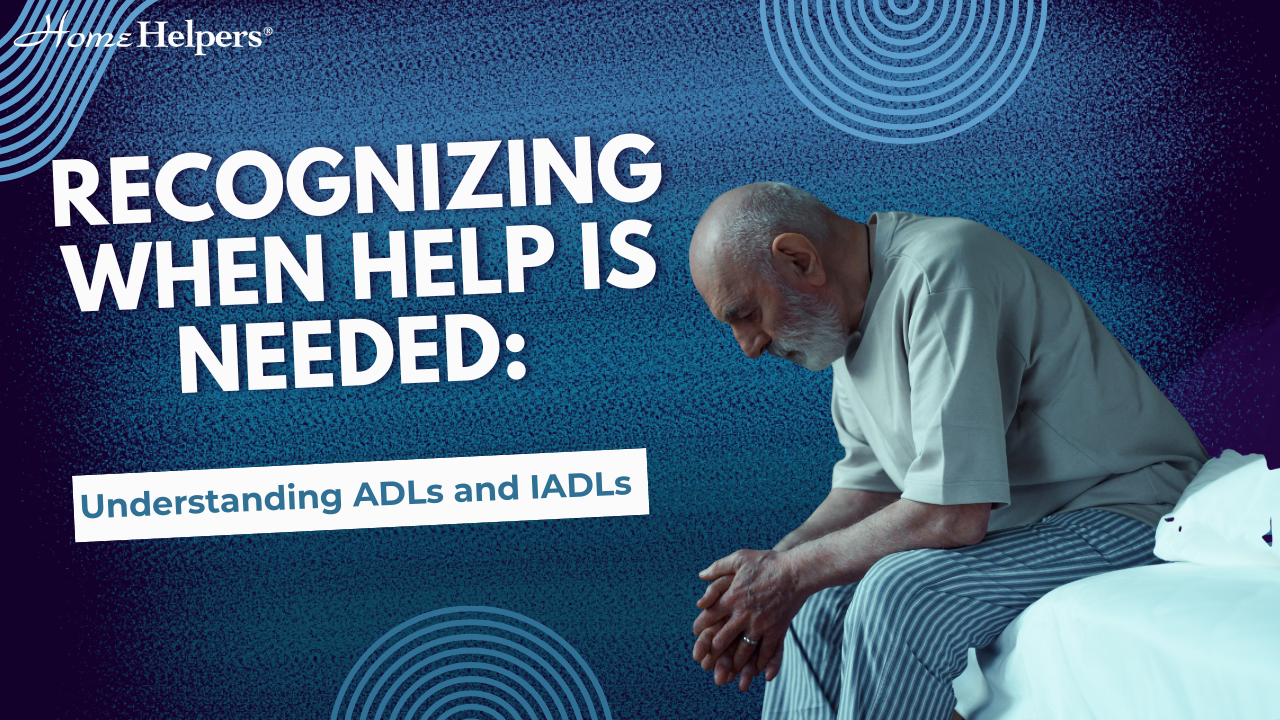Recognizing When Help Is Needed: Understanding ADLs and IADLs

Author: Home Helpers Martinsburg
As we age, everyday tasks like keeping a clean home, preparing meals, or managing personal hygiene can become more difficult. For many seniors, the gradual decline in these abilities is subtle—but over time, they may signal the need for additional support. Knowing when it’s time to bring in help often starts with understanding Activities of Daily Living (ADLs) and Instrumental Activities of Daily Living (IADLs).
These benchmarks can guide families as they assess a loved one’s functional independence and determine the most appropriate level of care.
What Are Activities of Daily Living (ADLs)?
ADLs refer to the basic self-care tasks essential for independent living. When seniors begin to struggle with these activities, it may indicate physical limitations, cognitive decline, or chronic health conditions that need attention.
The Katz Index of Independence in Activities of Daily Living outlines six core ADLs:
- Bathing and Grooming: Managing personal hygiene, including showering, brushing teeth, and nail care.
- Continence: The ability to control bladder and bowel functions.
- Dressing: Selecting and putting on weather-appropriate clothing.
- Mobility: Moving around safely, including getting in and out of bed or a chair.
- Feeding: Being able to eat independently (not including meal prep).
- Toileting: Getting to and from the toilet, managing personal hygiene afterward.
According to the National Center for Health Statistics, nearly 20% of adults over 85 need help with at least one ADL, making it a key factor in determining care needs (CDC, 2023).
What Are Instrumental Activities of Daily Living (IADLs)?
IADLs are more complex tasks that support independent living but require higher-order thinking skills, such as planning and organization. Difficulty with IADLs can be an early sign of cognitive decline or the onset of dementia.
The Lawton-Brody IADL Scale identifies these eight areas:
- Housekeeping: Cleaning, organizing, and maintaining a safe living environment.
- Laundry: Washing and managing clothing and linens.
- Managing Finances: Paying bills, budgeting, and monitoring bank accounts.
- Medication Management: Filling prescriptions and taking medications as directed.
- Meal Preparation: Planning and cooking meals that meet nutritional needs.
- Shopping: Procuring groceries and household items.
- Transportation: Driving or navigating public transportation safely.
- Communication: Using the phone, computer, or other devices to connect with others.
According to the Alzheimer’s Association, a decline in IADLs can often precede more obvious memory problems, making it an important indicator to watch closely (Alzheimer’s Association, 2024).
Using ADLs and IADLs to Guide Care Decisions
If you notice your loved one forgetting medications, skipping meals, or showing signs of disorganization, it’s time to assess their abilities using ADL and IADL checklists. These tools can help you:
- Understand your loved one’s day-to-day capabilities
- Communicate more effectively with medical professionals
- Plan for in-home care or other supportive services before a crisis arises
A decline in one or more of these areas doesn’t mean your loved one must leave their home—it may just mean they need a little extra support to remain independent and safe.
How Home Helpers Home Care of Martinsburg Can Help
At Home Helpers Home Care of Martinsburg, we specialize in supporting seniors through all stages of aging. Our compassionate caregivers are trained to assist with both ADLs and IADLs, allowing your loved one to maintain independence while receiving the help they need.
Services include:
- Personal care (bathing, dressing, toileting)
- Meal preparation and medication reminders
- Light housekeeping and laundry
- Transportation and errands
- Companionship and cognitive engagement
We tailor our care plans to match each client’s specific needs, providing flexible options from a few hours a week to 24/7 care.
Final Thoughts
Recognizing the signs that a loved one needs help can be emotional and overwhelming. But by understanding ADLs and IADLs, you can take a proactive step toward improving their safety, comfort, and quality of life. You don’t have to navigate this journey alone—Home Helpers Home Care of Martinsburg is here to help every step of the way.
📞 Call us today at (304) 433-8000 to schedule a free, no-obligation assessment.
Sources:
- Alzheimer’s Association. (2024). 10 Warning Signs of Alzheimer’s. Retrieved from www.alz.org
- Centers for Disease Control and Prevention. (2023). Health, United States, 2023. Retrieved from www.cdc.gov
- National Institute on Aging. (2023). Activities of Daily Living and Instrumental Activities of Daily Living. Retrieved from www.nia.nih.gov
